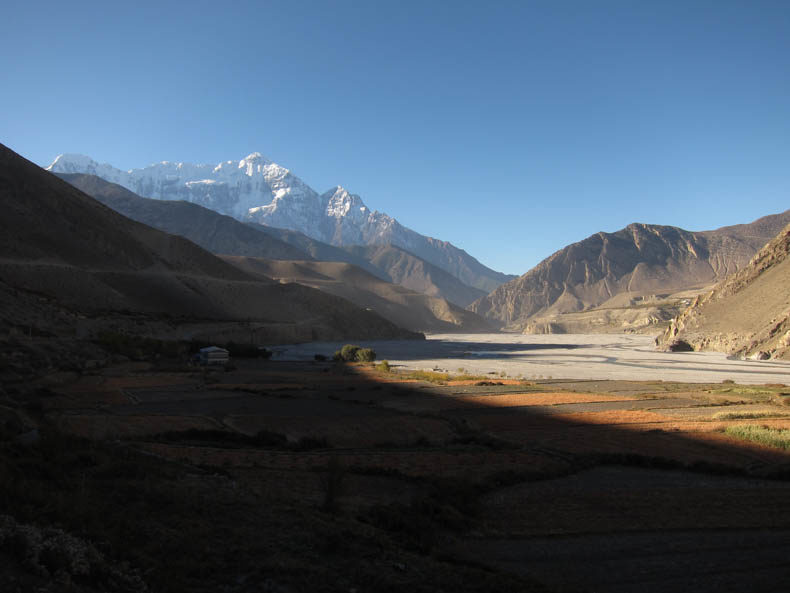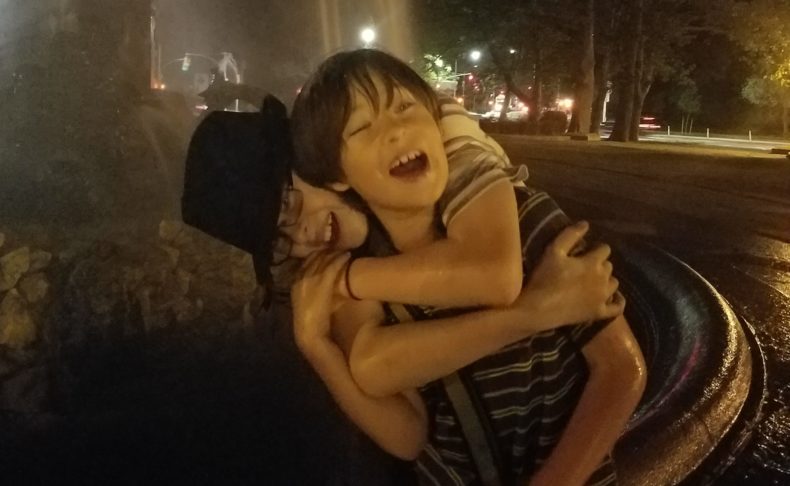 Ann: It’s been a fairly dreadful year, personally and nationally, and giving thanks is going to be a stretch. But even when I was a kid, I was thankless. When my grandfather said grace at Sunday dinners — “Bless, oh Lord, this food to our use and us to thy service” — I thought the words were pretty but didn’t see the point of saying them. When the aunts and uncles and cousins sat around the long Thanksgiving table and said that before we could eat the food, we had to say our thankfuls,* I said, “I’m not going to say I’m thankful for anything because it’ll just be taken away,” graceless adolescent that I was. In the decades since, I’ve figured out that if I’m going to say my thankfuls at Thanksgiving, I should pay close attention to what I have to be thankful for. But now that I think about it, why would anyone need to say thankfuls at all?
Ann: It’s been a fairly dreadful year, personally and nationally, and giving thanks is going to be a stretch. But even when I was a kid, I was thankless. When my grandfather said grace at Sunday dinners — “Bless, oh Lord, this food to our use and us to thy service” — I thought the words were pretty but didn’t see the point of saying them. When the aunts and uncles and cousins sat around the long Thanksgiving table and said that before we could eat the food, we had to say our thankfuls,* I said, “I’m not going to say I’m thankful for anything because it’ll just be taken away,” graceless adolescent that I was. In the decades since, I’ve figured out that if I’m going to say my thankfuls at Thanksgiving, I should pay close attention to what I have to be thankful for. But now that I think about it, why would anyone need to say thankfuls at all?
Emma: Well, a lot of people these days are expressing gratitude because it is supposed to make them happier (E.g. http://www.health.harvard.edu/healthbeat/giving-thanks-can-make-you-happier) But then again, I think this relentless pursuit of happiness is kind of screwed up in the first place.
Ann: Didn’t Erik’s post on Monday say something like this — bad things have more power over us than good?
Jenny: We do tend to remember the bad over the good…and the details of those memories are usually more accurate. Here’s one article that discusses this concept. Note that bad stuff is pushy and can knock good memories out of the way to make room for itself. How unfortunate.
Michelle: Or maybe it’s narrower, maybe we remember criticism more clearly than praise. Anyway, I think we might be able to argue that gratitude is a way of correcting our skewed perception of reality.
Ann: So then here’s my attempt to correct my skewed perception of reality. Today the weather has been surprisingly windy, no storms, just winds high enough to blow porch furniture around. Until today, most trees still had their leaves. But the wind hit and I drove down a tree-lined street through successive tornadoes of leaves — the air was full of red swirls, and then half a block later, full of cordovan swirls, then half a block after that, swirls of yellow gold. You forget that air is there until it’s full of leaves spinning and flipping, rising and falling. They made me laugh. Praise the Lord and pass the turkey.
Emma: Despite 2016’s wretchedness, I have lots to be thankful for: good health, enough money to feed and clothe my children with some left over for wine and chocolate and flowers, my friends–especially my funny friends–and of course the consolations of the natural world, which surround us all.
It is easy to forget to be grateful for this kind of stuff, and I suppose that is the point of Thanksgiving. Once, when I had a horribly stuffed up nose, I promised myself that next time I could breathe properly through both nostrils, I would remember to feel grateful. Surprisingly enough, I did remember, and though this fleeting thought was years ago now, I routinely remember to be glad I am not stuffed up and celebrate by taking a happy noseful of fresh air.
This year for Thanksgiving, I mailed a check to the food bank. Our plan is to get Chinese takeout and watch movies. What I am thankful for this year? Not having to do Thanksgiving.
Helen: Oh! I told myself a similar thing a few weeks ago, when I was in Nepal! That I would never again take for granted the ability to breathe freely. (Nepal’s air, I discovered, does not agree with my airways.) Or hot water. Hot water is fantastic, and I definitely appreciated those proper, unlimited-hot-water showers when I got to them. My breathing hasn’t totally settled down yet, but I’ll remind myself to be thankful when it does. And I’m very thankful that I had the opportunity to travel with my dad through landscapes like this:
Jenny: It’s true that feeling thankful isn’t easy these days, with so much negativity and ugliness spilling over into our day to day lives. That we need apps for and instructions on how to feel happy, well, that’s just sad. No amount of forced cheer can replace the real thing. I’m reminded of this when, during family events that feel obligatory to most attendees, my mother-in-law will put on a too-big smile and chirp, “Aren’t we having fun?!” trying to convince us, maybe even herself, that we are.
But there are always reasons to be grateful. I give thanks when my body doesn’t hurt as much as usual, and when I can lie in bed with coffee (splashed with real cream) reading the (non-political) news with a dog or two leaning against my legs. My recent book tour made me appreciative, especially when a number of kids told me that my books are what got them to like reading. I’m grateful to their parents and teachers for putting those books in front of them. I’ve been fortunate in my travels this past year—I visited incredible places stocked with animals I love and people I’m now proud to know. And I’m always thankful to come home to my little abode, to the man who never asks me not to go away but is truly relieved when I return. Now, I’ve just got to keep these warm feelings from being pushed aside by negative experiences. The emotions that accompany bad things are very grabby. Fight back.
Richard: In previous LWON holiday round-ups, I’ve twice mused on the same subject: sitting in a pub with a pint of lager and reading the Irish-British master William Trevor. For the LWON Thanksgiving post in 2013, I wrote, “One of his volumes of collected stories has 60, the other has 48, so opening one of those books to a new story feels to me a little like life: Eventually I’ll run out of William Trevor stories, but for now the bounty seems sufficient.” For the holiday round-up in 2014, I provided an update: “I’ve run out of stories. So I went back to the beginning and started all over again. But lest you think that re-reading William Trevor short stories is all I need to do in order to feel I’ve gotten a new lease on life, let me assure you: I’ve just bought his entire novel backlist.” Since then, I’ve finished re-reading the stories and burned through the backlist.
In preparing this year’s LWON Thanksgiving post, I thought I would write that I had now moved on to Alice Munro. But then came the news that Trevor died this past Sunday, at 88. Back to a pub on Monday I went to re-re-read his story “The Day We Got Drunk on Cake,” and I just want to say to any writers who might be reading this that if you read a story or novel of his, I guarantee you’ll learn a lot about writing, and I also want to say to any non-writers who might be reading this that if you read a story or novel of his you’ll learn a lot about living. Either way, you’ll feel better about the restorative power of art. “I have no philosophy,” Trevor told The Paris Review, as quoted in his New York Times obituary, “and I don’t impose on my characters anything more than the predicament they find themselves in.” The power of art is not so strong that it can help us make sense of every predicament, especially in this age of predicaments, but it can provide some perspective, and sometimes that’s enough.
Jessa: With my usual atheist caveat that I feel perhaps fortunate, rather than thankful, this year is actually quite a whopper for me. For more than a decade, I realize, I have been floating away into the life of the mind with less and less tying me to place and time. Even my involvement with the fine people of LWON further distributed my consciousness through the Internet into the United States and England while my body remained in the sub-Arctic or wherever it happened to be. I began to relate quite closely to the 1998 anime character Lain, who disappears into the wires in Serial Experiments.
Now suddenly, for a number of reasons, I feel situated, in place and time, and it makes for a lot of richness. My son’s school class of 12 kids happens to be one of those amazing cohorts that seems to congregate out of the ether once in a blue moon. They all get along like a house on fire, and I love each of them. There’s not a child in that class I wouldn’t adopt. And I’ve found people recently to whom I relate in ways I had all but forgotten. I must have feared that stepping out of the vacuum of outer space would thrust me into the ghastly overstimulation of a cocktail party, but instead I stepped out into a bamboo forest with just enough of a breeze to remind me that I have nerve endings. And I’m very grateful to those people who brought me out of my own mind.
Cameron: I like what Jessa said about feeling rooted. I, too, have started to come out of some fog and realize that I’ve been in the same place for 10 years, and that these things that seem to be growing around me must be roots. And I feel thankful for this place and the people here, and for something that seems like a new energy coming that will help me tend this garden I’ve landed in.
I’ve also finally caught on to a new holiday tradition: tamales. We first had them this year to celebrate the early spark of a friend’s long-hoped-for baby. Last night we had another round, and there are more coming in December. And tamales make me think of one of my earlier moments-to-be-grateful for: backpacking in Central America, we ended up one night at a crumbling hostel in a crumbling town. The night watchman saw us heating our stove, and, I imagine, must have thought it looked a little sad. He brought us the tamales his mother had made for dinner. Thank you to him, to his mother, and to all those people who show that, even if we only pass through each other’s lives for a moment, we can pass along a little light that shines for a lifetime.
Emma: Well, since I wrote my semi-smug thanks about not having to do Thanksgiving, a friend up the street found out my opt-out plans and invited me to her Thanksgiving. So now I am looped back into that sociality which underlies so much human happiness. And I’m even making cranberry sauce.
Michelle: For me, saying thanks is a way of giving my good memories a boost—which they need, not just because 2016 has been a pretty terrible year for the planet and those of us who live on it, but also because my brain, like yours, tends to hang on more tightly to bad memories.
So what am I thankful for? I’m thankful for great art, so necessary in shitty times: I’m thankful for Leonard Cohen’s sad, wise voice, a comfort in my post-election despair. I’m thankful for Dave Chappelle, whose brilliant SNL spoof of white people watching the election results hit so close to home that the knife didn’t even hurt when it went in. I’m thankful for Watership Down, which I just finished reading to my daughter; boy am I thankful that those brave, scrappy rabbits still outwit the despot.
And while I’m thankful for my daughter for countless reasons, this year I’m especially grateful to her for giving me my first post-election belly laugh, at 3:15 pm on November 9, and for keeping me laughing since.
Cassie: Nothing beats a belly laugh. Except maybe a toddler giggle. Instead of a written thankful, I’ll just leave you with this.
________
Abandoned dining room: Freaktography, via Flickr
Nepal: Helen Fields
Laughing kids: Craig Childs


I love William Trevor stories! And I love what everyone else wrote here. It makes me thank, er, grateful to pen around with such good, talented people who are lurching through life just as I am.
I love William Trevor stories! And I love what everyone else wrote here. It makes me thank, er, grateful to pen around with such good, talented people who are lurching through life just as I am.
To Emma, I don’t think that practicing gratitude is not simply a pursuit of happiness. The general satisfaction in one’s life is a side effect, true. There are numerous studies that link the practice of gratitude to multiple positive attitude changes. It’s a good practice unless one is addicted to bitterness, which is will erode
Mr. McKee, you are right, that it is good to be thankful for the good things in life. I object to forcing oneself to feel gratitude as a kind of “life hack” to become happier. But as those who raised us mostly taught us, the real reason to remember to be grateful is to thank the people (and others) who deserve thanks. So thanks mom, thanks husband and kids, thanks mountains, and thanks tomato soup! (If this makes me happier along the way, I’ll take it.)